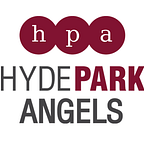Identifying the Right Metrics to Measure Traction
Knowing Your Value
This post is part of the Hyde Park Angels Entrepreneurial Education Series, which brings together successful, influential entrepreneurs and investors to teach entrepreneurs everything they need to know about early-stage investment through events, articles, videos, and more.
Like market size, traction is a term that gets thrown around in investment and entrepreneurial circles all the time, but isn’t always clearly defined. That’s a serious problem. As an entrepreneur, you need to be able to understand your traction backwards and forwards because it’s one of the biggest predictors of future growth and one of the best tools to assess your company’s performance in the market. At its most basic, traction is the adoption rate for a product or service. This seems simple enough, except there are dozens of metrics you can use to measure something as broad as an “adoption rate.” To name a few:
· Monthly Recurring Revenue
· Total Number of Paying Users / Customers
· Total Number of Non-Paying Users / Customers
· Total Number of Products / Units Sold
· Month Over Month User Growth
· Revenue in Last Year
· Total Revenue
· Month over Month Revenue Growth
Want more resources like this? Subscribe to the HPA newsletter!
Depending on the value you’re trying to create, some, all, or none of these metrics matter. This is where it becomes crucial to know your target audience and its needs. None of these metrics means anything without contextualization.
One way to measure traction is to start by asking what behavior you’re trying to change. Medium is a great example of this. The company’s CEO, Evan Williams recently wrote:
“We want to create a platform that enables people to make an impression on others. To make them think. To change their minds. To teach them something or connect emotionally.”
While that’s admittedly very difficult to quantify, Medium has come up with a metric to show traction, total time reading. “TTR” measures how much time people spend on story pages. It’s not perfect, but it’s certainly more meaningful than impressions. If the company’s value is getting people to read the content and engage intellectually and emotionally, the mere fact that a lot of people saw it doesn’t mean much. That they read it, and that they took a long time process it is far more telling. If the “TTR” grows, that means they’re successfully changing behavior — skimmers are slowing down.
The idea behind the strategy is simple: know your value and measure your traction according to what it is.
If you are interested in learning more about whether to raise a fund, register for “Are You Ready to Raise?” on March 5.
Like what you see? Subscribe to our newsletter!
About Hyde Park Angels
Hyde Park Angels is transforming early-stage investing by taking a people first approach. The organization is the largest and most active angel group in the Midwest. With a membership of over 100 successful entrepreneurs, executives, and venture capitalists, the group provides critical strategic expertise to entrepreneurs and the entrepreneurial community. Nearly 40% of our members have founded a company, 88% are CEO’s, top executives or corporate board members, and 100% invest in startups. By leveraging the members’ deep and broad knowledge of multiple industries and financial capital, Hyde Park Angels has driven multiple exits and invested millions of dollars in over 40 portfolio companies that have created over hundreds of jobs in the Midwest since 2006.
About the Author
Alida Miranda-Wolff
Alida Miranda-Wolff heads up communications and strategy at Hyde Park Angels, crafting and disseminating the organization’s brand in all forms across all channels. In addition to single-handedly building HPA’s integrated communications plan and executing its core elements, Alida manages membership, partnerships, portfolio company support, and all community engagement.
Prior to joining Hyde Park Angels, Alida served in a variety of journalism, marketing, communications, and management roles, specializing in creating spreadable multimedia content for tech-enabled businesses at all stages. Alida has run several Kickstarter campaigns, including one of the most successful in Chicago history, and still mentors companies running their own campaigns.
Alida graduated Phi Beta Kappa from the University of Chicago in 2014 with multiple honors and awards. She remains active in the university of alumni network, serving on five advisory boards and committees. Alida is also a published author and poet, with two poetry chapbooks currently in print, Domestic Scenes and Tree Fingers.
